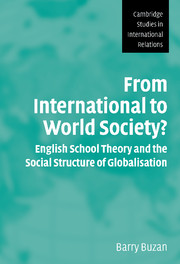 From International to World Society?
From International to World Society? Published online by Cambridge University Press: 14 January 2010
Throughout the previous chapters I have registered a steady drumbeat of dissatisfaction with the combination of neglect and resistance that marks the attitude of most classical English school writers towards the subglobal/regional level. Sub-global and regional manifestations of international social structure have either been marginalised by a focus on global scale and universal principles, or resisted because seen as threats to the development of global scale international society. Wight's and Watson's explorations of historical states-systems do not count because most of those systems were substantially self-contained, and not part of a global scale interstate-system.
I am not the only dissatisfied customer of the classical English school tradition in this regard. Zhang (2002: 6) notes that:
A cursory survey of the existing literature reveals a strange silence on the part of International Society scholars on regionalism. Deliberations by scholars of the English School on regional levels of international society in the twentieth century are until very recently muted, if not entirely invisible. Such silence is best reflected in an important essay on regionalism in 1995 by Andrew Hurrell. The comprehensive survey of Regionalism in Theoretical Perspective conducted by Hurrell contains no specific mentioning of either the English school or International Society perspective. It is remarkable that Hedley Bull is mentioned only once towards the end of his book as ‘that arch-regional sceptic’ (Fawcett and Hurrell 1995: 327). Even critical International Society as summarized nicely by Dunne (1995) does not seem to have made much dent on the studies of regionalism.
To save this book to your Kindle, first ensure [email protected] is added to your Approved Personal Document E-mail List under your Personal Document Settings on the Manage Your Content and Devices page of your Amazon account. Then enter the ‘name’ part of your Kindle email address below. Find out more about saving to your Kindle.
Note you can select to save to either the @free.kindle.com or @kindle.com variations. ‘@free.kindle.com’ emails are free but can only be saved to your device when it is connected to wi-fi. ‘@kindle.com’ emails can be delivered even when you are not connected to wi-fi, but note that service fees apply.
Find out more about the Kindle Personal Document Service.
To save content items to your account, please confirm that you agree to abide by our usage policies. If this is the first time you use this feature, you will be asked to authorise Cambridge Core to connect with your account. Find out more about saving content to Dropbox.
To save content items to your account, please confirm that you agree to abide by our usage policies. If this is the first time you use this feature, you will be asked to authorise Cambridge Core to connect with your account. Find out more about saving content to Google Drive.